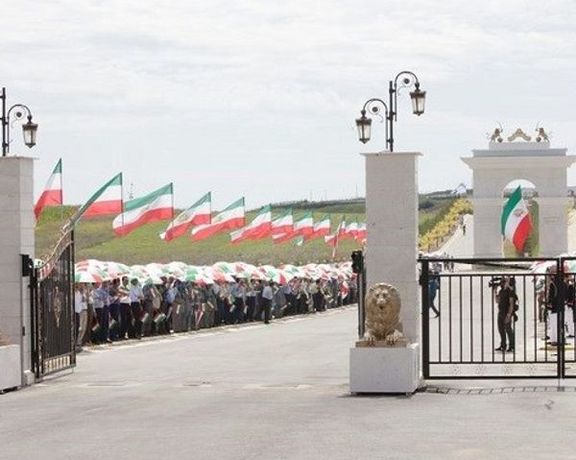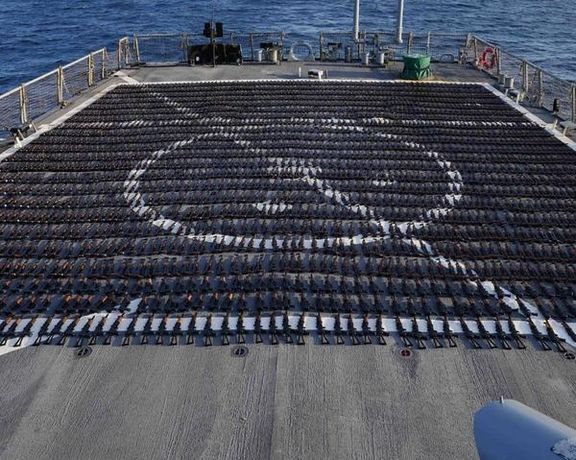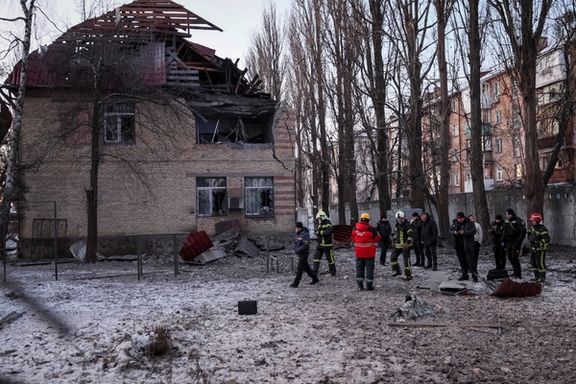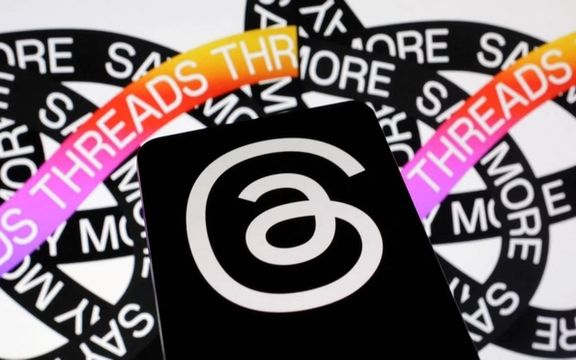Albania Denies Tehran's Claim About Transfer Of MEK Devices To Iran

Albania has denied Tehran's claim that the computers seized from the exiled opposition group MEK during a police raid have been handed over to Iran.

Albania has denied Tehran's claim that the computers seized from the exiled opposition group MEK during a police raid have been handed over to Iran.
The Albanian police informed Iran International on Friday that they had not contacted the Iranian government or any Iranian citizens as part of their investigation into the group's activities.
This contradicts an earlier claim made by a spokesperson for the Iranian government, who stated that several electronic and storage devices seized during the recent Albanian police raid on the MEK's Camp Ashraf had been handed over to Iran's regime.
The Iranian official alleged that the Islamic Republic is now retrieving data from the devices to identify the group's cells and has achieved "promising" results thus far.
On June 20, the MEK reported that around a thousand Albanian police officers raided their exile center, Camp Ashraf, using tear gas and pepper spray. The group stated that one of their members, identified as Ali Mostashari, was killed, and over a hundred others were injured.
Albania later admitted that both police officers and Iranian dissidents were injured during the raid at the Ashraf-3 camp near Manze, a small hill-town approximately 30 kilometers (about 20 miles) west of Albania's capital.
However, the authorities disputed the claim that the raid directly caused the man's death.
The Camp Ashraf 3 compound in Durres, Albania, serves as the MEK's first home outside the Middle East. It was established a few years after the 2013 massacre in the original camp in Iraq, in which 52 members died and seven went missing, leading to the relocation of the group.

The US Justice Department filed a forfeiture complaint Friday for suspected Iranian arms confiscated by the US Navy from vessels in the Persian Gulf region since 2021.
The Justice Department filed a forfeiture complaint against, “over 9,000 rifles, 284 machine guns, approximately 194 rocket launchers, over 70 anti-tank guided missiles, and over 700,000 rounds of ammunition that the US Navy seized in transit from Iran’s Islamic Revolutionary Guard Corps (IRGC) to militant groups in Yemen,” a statement said.
The arms were seized on four occasions, twice in 2021 and twice in 2023, from stateless small vessels in regional waters, apparently part of regular Iranian arms supplies to Houthi fighters in Yemen. Iran is also suspected of supplying drone and missile technology and production means to Houthis who overthrew Yemen’s government in early 2015.
“These interdictions led to the discovery and seizure of four large caches of conventional weapons, including long arms and anti-tank missiles, and related munitions – all of which were determined to be primarily of either Iranian, Chinese, or Russian origin,” the Justice Department said.
It also underscored that the seizure showed continued efforts aimed at stopping illicit weapons trafficking by the IRGC.
In March, the US government took forfeiture action against over one million rounds of ammunition “en route from Iran to Yemen.”
US government agencies with “assistance from US Naval Forces Central Command, will continue to identify, disrupt, and dismantle Iran’s illicit flow of weapons at every level to prevent Iran’s illicit activity in the region and globally,” HSI Washington, DC Special Agent in Charge Derek W. Gordon said.

As Europe says it will retain sanctions on Iran over its missile programs, the regime’s foreign minister says talks have begun with three European powers.
Iranian Foreign Minister Hossein Amir-Abollahian made the claim in an interview with Chinese TV channel Phoenix following Thursday's UN Security council’s session to discuss Iran’s nuclear advancements and its arms supply to Russia as well as Tehran joining the Shanghai Cooperation Organization (SCO).
“In the past several weeks, Iran has started talks with three countries of Germany, France and England,” he said, noting that “talks started in Norway and recently continued in Abu Dhabi, in the United Arab Emirates.”
Amir-Abollahian expressed hope that these talks are aimed at overcoming “misunderstandings,” paving the ground for the Islamic Republic and the E3 countries (France, UK and Germany) for “better interaction and cooperation.”
What the top Iranian diplomat described as “misunderstandings” are the implementation of the UN resolution 2231, which endorsed the 2015 nuclear deal. As part of the defunct agreement, UN sanctions imposed on the regime over its ballistic missile program are set expire in October, but the three European parties of the accord argue that Iran has violated the pact, therefore the sanctions should remain in place.

They base their argument on evidence that proves Iran is supplying weapons for the Russian invasion of Ukraine – on which Iran should have coordinated with the UN Security Council – and on IAEA reports that prove Iran is stockpiling highly-enriched uranium beyond the levels allowed in resolution 2231.
Amir-Abdollahian did not mention the drone supplies to Russia but Iran has maintained an ambivalent approach about its military dealings with Moscow. While it keeps repeating claims that Iran supports peace in Ukraine, it argues that the drones were sold to Russia before the invasion began, despite colossal amounts of evidence, including multiple Iranian Shahed drones shot down over Ukraine. In the latest development, satellite imagery indicates that the regime has also set up a drone manufacturing line in Tatarstan Republic to jointly produce the drones with Russia.
Western navies have also seized multiple shipments of Iranian arms in the Persian Gulf waters apparently destined for Houthis in Yemen, including in one instance missile and drone parts, in violation of existing UN sanctions.
At the same time, Rosemary DiCarlo, Under-Secretary-General for Political and Peacebuilding Affairs, said that during the Security Council’s session on Thursday, Iran and the Russian Federation claim there was no evidence linking the intercepted vessel and its cargo to Iran, and no clear indication that the seized components were of Iranian origin.
Amir-Abollahian's remarks also followed a phone call with the EU’s foreign policy chief Josep Borrell who warned the Iranian foreign minister against arms supplies to Russia. The European Union, multiple European countries and the United States have been warning Iran against supplying weapons to Russia since its Shahed Kamikaze drones were deployed by Moscow last year against civilian and military targets in Ukraine. So far, Russia has launched hundreds of these loitering munitions, mostly against infrastructure and centers of population.
Iran's FM also said in the interview that the Ebrahim Raisi administration is following two courses of action simultaneously to deal with the sanctions. “The first path is to try to neutralize the sanctions and the other path is to try to cancel the sanctions using the tools of diplomacy and negotiation. We move in both directions,” he said.

The Islamic Republic has been involved in the abduction in Iraq of a Russian-Israeli academic, an Iraqi official has told Israeli media.
While the Iran-backed militant group Kata'ib Hezbollah has denied any involvement in the kidnapping of Elizabeth Tsurkov, a Russian-Israeli academic and a PhD student at Princeton, an Iraqi official told Israel's Channel 11 that Elizabeth Tsurkov was arrested by Iraq's intelligence service - or someone posing as such - before being handed to Iran-backed Kata'ib Hezbollah which has been holding her for months.
On Thursday, a commander of the Iran-backed group had denied any involvement in the abduction. The Iraqi government spokesman also told Reuters on Friday that investigations are being carried out into the incident.
An expert on regional proxies across the Middle East including Turkey's proxies in Syria, she had traveled to several of the region's terror hotspots. Israel's Prime Minister's Office released a statement which confirmed Tsurkov is still alive, adding that the situation is being handled by the relevant bodies in Israel.
Tsurkov's mother Irena said they lost contact two months ago. "From what I had known until today, she was in Turkey, working on her research for Princeton. I didn't even know she was in Iraq," she told Israel's N12 News.
Israeli citizens are forbidden from traveling to Iraq — an enemy state where Kataib Hezbollah is one of the most powerful Iran-backed militia groups, with a history of attacking US targets in the area.

Iranian rap artist Saman Seydi, better known as Saman Yasin, has been "severely tortured" in prison, Iran International has learned.
Seydi was arrested in October 2022 during the anti-regime protests in Iran, and was handed a death sentence. However, his appeal against the sentence was accepted in December, and now he is expecting a retrial.
"During the interrogations, Saman was severely tortured to confess he was carrying weapons (when arrested). They threatened to arrest members of his family should he refuse to make the confession they demand," a source close to Seydi's family told Iran International.
The source said Saman had been "suspended in the air" in prison for three days so that he would be forced into confession.
Saman Yasin's retrial was supposed to be held on May 8, 2023. However, he has been left in limbo in Rajaeishahr Prison, west of Tehran, awaiting his court session without access to a lawyer.
The 25-year-old dissident rapper from the Kurdish-majority Kermanshah province in Western Iran, reportedly attempted suicide in prison by taking a large number of pills back in December.
While the Islamic Republic's Judiciary accepted the appeal against Saman Yasin's death sentence, he still faces the charge of acting against the country's national security and "waging war against God", which is punishable by capital punishment.

In the swiftest social media platform migration ever witnessed, millions of Iranian Twitter users have flocked to Threads following its launch on July 6.
Threads, a microblogging platform provided by Meta, the parent company of Instagram and Facebook, has attracted a significant number of Iranian users. Instagram, already a popular social media platform in Iran with over 24 million users according to state officials, may contribute a substantial user base to Threads. Moreover, many frustrated Twitter users, who have been displeased with recent ad-hoc changes on the platform, are also making the switch.
Twitter's implementation of new restrictions and changes, such as reducing the number of tweets users can read to 300 (although "verified" users paying a monthly fee have access to more), has drawn constant complaints from Iranian users. Although Twitter later increased the limit, the damage was already done, and many users began considering a move away from the platform.
Alternative options for Iranian users included Mastodon, which is less popular than Twitter, and Blue Sky, a platform in the beta stage that accepts new members by invitation only. Last week, many Iranians were searching for Blue Sky invite codes, although invitations are limited to one per current user every two weeks.

In 2020, Fars News Agency, affiliated with the IRGC, estimated that there were approximately 49 million Iranian accounts on Telegram, 47 million on Instagram, and 2 million on Twitter. Since then, the number of Twitter users must have significantly increased, especially during the anti-government protests in 2022 and 2023, during which the platform became a vital resource for debates and information sharing.
By mid-day London Time on Thursday, more than 20 million users had joined Threads, including between one and two million from Iran, according to UK-based Media Metrics Limited, which also said accurate metrics is challenging, as most Iranians use virtual private networks (VPNs) to conceal their location from the watchful eyes of repressive security forces. VPNs make it appear as if these users are based in countries other than Iran, where social media is strictly banned by the government.
A Threads user named Rasul Asadzadeh expressed in his first post, "From Yahoo! Messenger to Threads. Social media has provided us with a platform to voice our grievances. Hey Freedom! Give us back the echo of our voice. Our hair is turning white."
Meanwhile, in Tehran, by mid-day (early morning in London), when the number of Threads members reached ten million, a user going by the pseudonym Hazer Javabi stated, "Believe me, seven million of them are from Iran."
Tehran has concerns about the organizing and mobilizing power of social media, particularly in light of the increased number and strength of opposition groups and citizens opposing the regime since the nationwide protests in 2022.
Until late June, Twitter served as the primary online venue for Iranian political activity, with virtually every political group and politically engaged individual, regardless of affiliation or agenda, active on the platform. However, as of Thursday morning, many had migrated to Threads, perhaps permanently. Others plan to maintain their Twitter accounts for a while before figuring out how to transition their followers to Threads.
Twitter had been grappling with growing concerns about the presence of trolls and bots, as political tweets often featured vulgar language and insults. A Threads user named Parham Ghobadi wrote on Thursday, "Apparently, bots and the cyber army have not arrived here yet. It's still a healthy environment."
Despite the overwhelming welcome Threads has received, users familiar with social media dynamics and cultural and political nuances in Iran predict that Blue Sky, once it surpasses the hurdles of its beta phase, will likely emerge as the biggest winner in the microblogging market. They attribute this to owner Jack Dorsey's marketing expertise, as the co-founder and former CEO of Twitter. Additionally, many Iranian users find Instagram's advertising annoying, making them hopeful that Threads' marketing strategy will differ from that of Instagram.